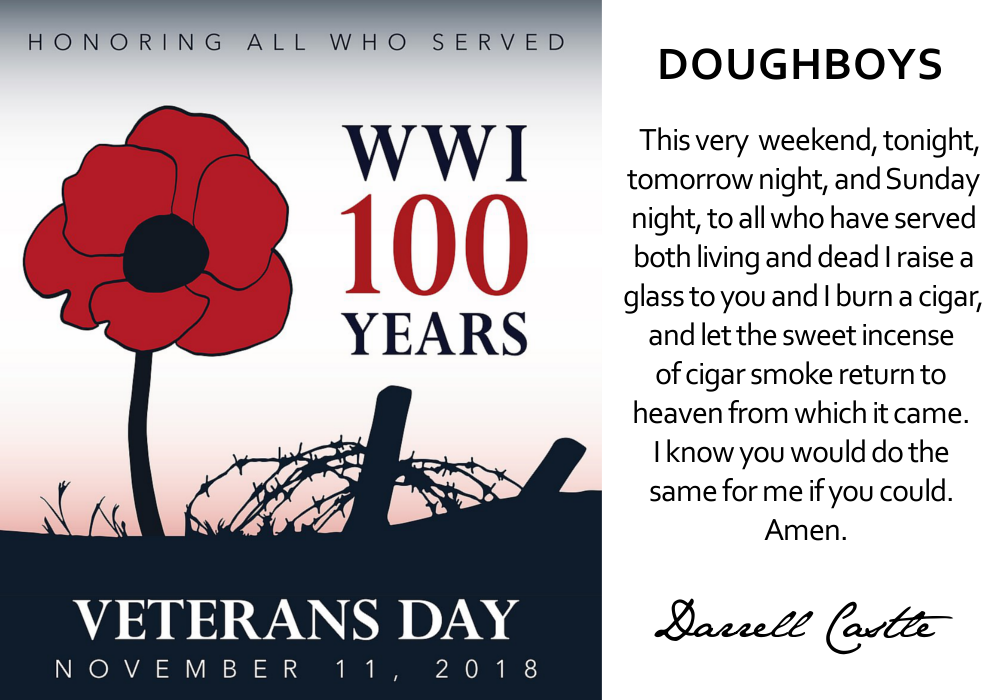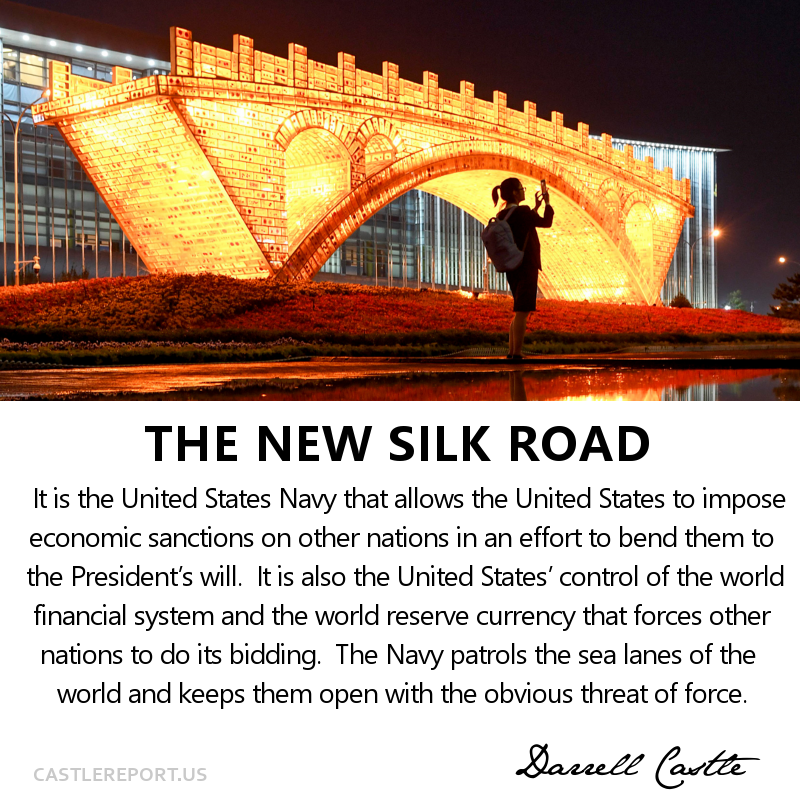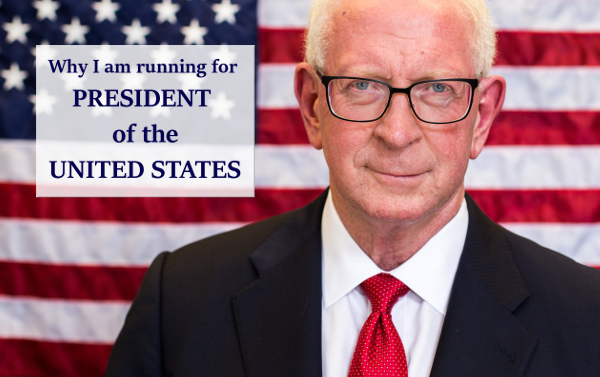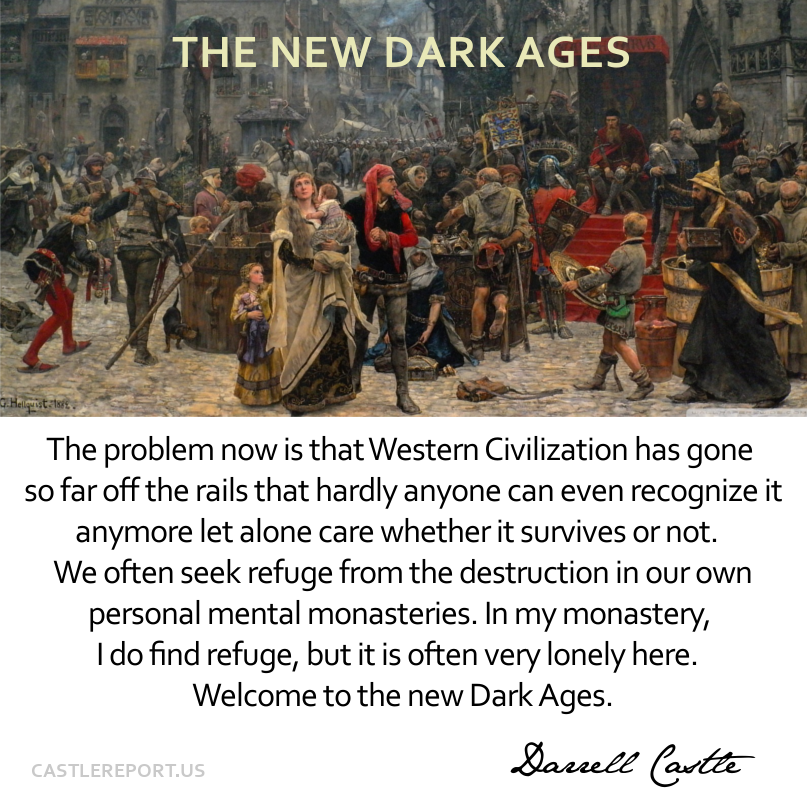
Doughboys
Podcast: Download
Darrell Castle talks about the 100th anniversary of the end of World War I, and how that war still effects us today.
Transcription/Notes
DOUGHBOYS
Hello, this is Darrell Castle with today’s Castle Report. Today is Friday, November 9, 2018, and on this Report I will spend the time I have with you reminding you that tomorrow November 10 is the Marine Corps birthday but more importantly for this week, Sunday, November 11, 2018, is the 100th anniversary of the end of World War One, or what used to be known as “Armistice Day”.
I talk about the 100th anniversary in order to honor those who served, and especially those who died in that European struggle. It was a European struggle for the most part, pitting England, France, Italy, Romania, and Russia against Germany and what was then known as the Austro-Hungarian Empire. The end of the War brought an end to the Austro-Hungarian Empire as well as the Ottoman Empire. New countries were born and old countries died. Modern day Turkey, Iraq, Iran (not Persia but Iran), and Saudi Arabia were all created along with the right of Jews to immigrate to Palestine, resulting ultimately in the state of Israel after World War Two. Communism and Fascism had their start along with Lenin, Stalin, and Hitler.
What caused all this slaughter that was to come from 1914 to 1918? There are many answers and probably none of them completely or totally accurate, but for one thing, Europe’s old leaders–its nobility, its royalty were all related. England, France, Germany, Austria, Italy, and Russia, all had royal families that were intermarried and interrelated. It was a family squabble with a lot of old scores and old grudges to settle. None of them could imagine the slaughter to which their people were about to be subject, or the fact that the war would destroy their families and the Royal system itself.
The world was altered in virtually every way by that war, even geographically, as the geography of the continent was changed in several ways. Six thousand square miles of France was converted into an uninhabitable wilderness and vegetation has still not completely recovered. Some hills across the continent were lowered by 50 to 100 feet by the shelling. Not a single living tree stood in Belgium because of the many years of fighting there. The warring armies both used the tactic of tunneling deep under the trenches of the enemy to plant massive explosive charges and collapse the enemy trenches but the explosions also collapsed the surrounding landscape creating vast lakes that still exist today.
The social order of Europe was changed by the massive number of men under arms and gone for so long. Women were pressed into service in many occupations previously reserved for men. The social class structure, which was so rigid before the war with the master-servant class system unshakable, was shaken to the core and destroyed by the war. The sons of the nobility were expected to lead the movement to fill the ranks and to provide leadership in the officer corps. So many of the nobility and other upper classes were slaughtered in the trenches there was not enough of them left to maintain the system. Women refused to go back into servitude and demanded their place in society. Women were elected to parliament for the first time. Women in parliament would have been unthinkable before the war, but people suffered so much everything was different.
I said that I wanted to remind you of this anniversary as a way of honoring those who served and especially those who died. Well, there were certainly a lot of people to honor, and that’s for sure. Somewhere in the neighborhood of 15 million combatants were slaughtered in the trenches of Europe and around 40 million wounded, many horribly. Plastic surgery was begun as a way to repair some of the horrible wounds that kept men from being able to lead normal lives.
Vast pandemics of disease spread across the world killing millions. The Spanish Flu epidemic killed an estimated 18 million during the war. The Spanish Flu would rip through any area that had mass numbers, such as POW compounds and places where soldiers were sent to recover from wounds. An entire generation of Europe’s young men was destroyed leaving a gap that could never be completely filled.
The war spawned many people who rose to fame later, but who received their initial training in World War One. Some of those were Adolph Hitle, who left the Austrian/German army as a corporal, and 14 years later was elected Chancellor of Germany; Winston Churchill, who had a date with destiny and with Hitler some 20 years later. Harry Truman was an artillery officer, George Patton got his early work in the war as tanks were invented, and Douglas Macarthur was wounded several times, all during World War One. The great German generals such as Rommel, Von Runstedt, Guderian, and Keital, all were trained in tactics during their World War One service in the German Army.
Tanks, machine guns, poison gas, and war planes all were invented, and the greatest nations on earth devoted 100 percent of their industrial might to finding new and better ways to slaughter each other.
The United States managed to stay out of the War until finally, in late 1917, it succumbed to War propaganda and declared war on Germany. Although war was declared against Germany in 1917, American troops did not arrive in France until May of 1918. There are many theories about how they acquired the nickname “doughboys”, and I suppose one theory is as good as another. Some said their uniforms with the bulky greatcoats, some said the color of their buttons, some said they had a fondness for doughnuts, some said the dust kicked up by their vehicles and marching feet made them look like dough.
There were no passenger airplanes then so they traveled to France by ship, about one million of them. They had to march and use wheeled vehicles to get from the French coast where they landed to Paris. When the French General Lafayette served so gallantly on George Washington’s staff, Washington told him that someday America would repay that debt to France. The commanding general of the American Expeditionary Force General John (Blackjack) Pershing was aware of that promise, and when he got to Paris he went to Lafayette’s statue and said, “Lafayette, we are here.”
Stories appearing in the newspapers of the day, since there was no television and no internet, people read newspapers for information, mentioned the appearance the Americans made to the French civilian population, especially the women. They were described as big and boisterous and full of life, always laughing and joyful. I supposed they were, compared to the French and British soldiers suffering from three years of trench warfare, wounded, starved, wracked by disease and suffering from psychosomatic conditions. The Americans were new, fresh and had never tasted defeat and never experienced one minute of trench warfare.
American soldiers and Marines didn’t believe in trenches, they believed in forward momentum no matter what it cost. Tomorrow, the 10th of November, is the Marine Corps birthday and the United States Marine Corps is the only American unit to have a full-park like memorial similar to a national battlefield such as Gettysburg here in America, located on French soil. The Germans were threatening Paris when the Americans arrived and had opened a salient into a wooded area known as Belleau Wood, and since Paris was in danger, the Germans had to be dislodged from that Wood. The task was assigned to the Marine Corps, the first major combat engagement for the Americans in the war. Tactics back then were different from today, and from what I was taught. The Germans were dug into the woods and had some 40 machine guns with interlocking fire trained on the open ground in front of the Wood. I was taught that the proper tactic would be to set up a base of fire to suppress enemy fire and then maneuver toward the enemy rotating the attacking units and firebase units to confuse the enemy.
These Marines instead formed in line abreast, stood in the tall grass and walked toward those machine guns in good order. Five times the Germans broke their attack and drove them back but on the sixth attack they were successful in putting the Germans to the bayonet. In that one brief battle the Marines suffered 10,000 casualties. The Germans and the Allies as well, understood then that the Americans were there to stay and the end of the war was a foregone conclusion.
The Americans in total suffered about 50,000 dead and 200,000 wounded in World War One. If you count those lost to disease the death toll is more like 120,000. The slaughter was on such an unimaginable scale that no one could possibly believe that such a thing could ever happen again. The whole world just committing mass suicide at the same time was more than anyone could comprehend. Just about 20 years later it did happen again, with exactly the same nations, with a couple of new ones thrown in for good measure.
In conclusion, the boys were called to arms, and they as well as the country, were rather naive then. Southern boys from Mississippi, Alabama, and Georgia, farm boys from Ohio and Kansas, city boys from New York and Chicago all signed on to become Doughboys. Even a cadre from Ivy League Universities, known as the Harvard volunteers, helped fill the ranks, and off they went to France about one million of them. There are none left alive, not from any nation on earth, not a single living World War One Veteran.
Finally folks, this very weekend, tonight, tomorrow night, and Sunday night to all who have served both living and dead I raise a glass to you and I burn a cigar and let the sweet incense of cigar smoke return to heaven from which it came. I know you would do the same for me if you could. Amen!
At least that’s the way I see it,
Until next time folks,
This is Darrell Castle,
Thanks for listening.






8 Comments
William Marvel
This message blessed my heart, with joy and sadness at the same time. Yes, even as a young boy, I remember those United States of America Doughboys and the ones that returned back to the USA. My grand-dad was in the WW1 and did a fantastic work, his friends too. I respected all of them dearly and I met many. Thank you for honoring the WW1 Doughboys sir, Semper Fi and Happy Birthday Marine!
Sincerely,
W.Marvel
d stowe
Thanks for the History lesson. I wish I could have learned this in school, but It’s about time that IT was said so eloquently.
Nicely done sir.
Cheers Marines
ds
Mickey White
Thanks Darrell. I posted a letter my Grandfather wrote from France in May of 1919..
http://mickeywhite.blogspot.com/2018/10/i-pity-man-who-couldnt-come-over-my.html
Darrell
Thanks D and William for your touching words of kindness.
Darrell
Darrell
Thanks Mickey. You should treasure that and I know you do.
Darrell
Jude
Thank you for that eloquent and moving tribute. It is possible that if we reflected more carefully on the enduring consequences of our past wars, we could persuade our leaders that war is rarely worth the cost. I suggest you consider writing and publishing an essay on that topic.
Today I watched the Remberance Day wreath laying ceremony and Service at Westminster Abbey. One of the recurring themes was that of the urgency of reconciliation. For the first time in this annual commemoration, the President of Germany laid a wreath at the Cenotaph alongside Queen Elizabeth ll. A pratical symbol of former enemies working together for justice and peace.
Darrell
Thank you I will certainly consider that. We can discuss it at Thanksgiving.
JONATHAN TAUB
when i think of those brave idealistic (and possibly naive and ignorant) young men who were needlessly slaughtered in that stupid trench warfare which may have been the result of economic war more than any moral cause it makes me think of two things:
1) maybe the hippies and tree huggers were not that stupid after all
2)we have it a lot easier today